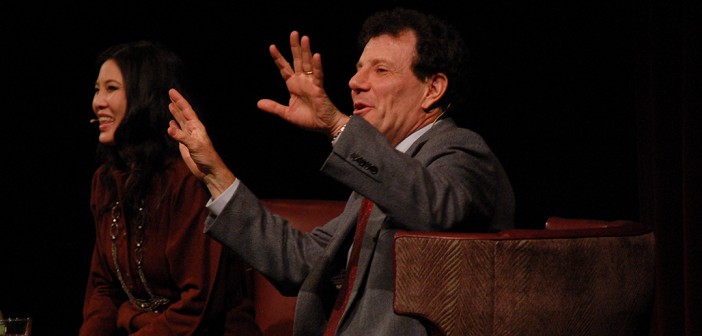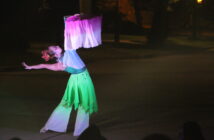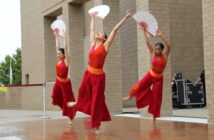The 85 richest people in the world own as much as the entire lower half of the population.
This statistic appeared on a screen in front of the large audience gathered in Baker Hall Tuesday night, as Pulitzer Prize winning journalists and couple Nicholas Kristof and Sheryl WuDunn presented this year’s Kenner Lecture.
Kristof and WuDunn’s lecture, entitled “Why Students Should Care about the World and Change It,” focused on startling facts about economic inequality and the positive influence that individuals can have on these issues.
The pair drew much of their lecture from the books they co-wrote, “Half the Sky: Turning Oppression into Opportunity for Women Worldwide” and “A Path Appears: Transforming Lives, Creating Opportunity.”
At the start of the lecture, WuDunn posed the question: “If there was a new drug that made everything better and had zero negative side effects, would you take it?”
WuDunn went onto explain that this “drug” is available in the form of philanthropy. She explained that when someone performs philanthropic acts to combat inequality in the world, it is as if this individual has taken this “drug.”
To convey the positive impact that philanthropy can have, Kristof and WuDunn incorporated true stories of people from around the world in to their lecture. They focused on the positive changes in the world that have been initiated by philanthropic and kind acts.
In one of their stories, they described an encounter between a librarian and a troubled student, Olly. Olly once stole a book from her library, and the librarian did not stop him. Instead, she drove over 70 miles to a used bookstore to find another book by the same author to replace the one that Olly stole. She placed the new book on the shelf and watched him steal the book she just purchased to replace the one he previously stole.
Olly continued to read, and he eventually applied to college because of his love of reading. He went on to become the first African American district-prosecuting lawyer in the state of Arkansas.
“Every now and then, you can take a risk on somebody,” Kristof said about the story of Olly. “And you can have this transformative effect on them.”
Simon Hwang, ’17, attended the lecture and related much of what was being said to his time abroad in China. While in China, he learned first-hand the meaning of philanthropy.
“An individual has the option of helping both domestically as well as internationally,” Hwang said. “But ultimately, philanthropy boils down to people helping people.”
Kristof and WuDunn also discussed the importance of education in combating poverty in today’s world.
Kristof explained that the most cost-efficient way to educate children in the developing world is to deworm them – a fact that surprised many in the audience.
Kristof pointed out that most audience members did not have to worry about life-threatening, preventable illnesses when they were going through school.
“When you win the ‘lottery in life’ there are obligations that go with that,” Kristof said. “It’s in fulfilling those that you find purpose.”
“Listening to this presentation made me conscious to the vast amount of problems that are present in the world and that are left in the shadows,” Nathan Braithwaite, ’17, said. “Something as simple as providing basic medical care for these students would make a huge difference in the long run.”
Monica Miller, professor of religion and Africana studies and director of women, gender and sexuality studies, wrote in an email that helping others is more than simply doing a physical or tangible task — it also incorporates having a consciousness of the mind.
“If all of the images of ‘those in need’ look a certain way (i.e., are all black and suffering) and all of the images of those who help are, say, all white, straight and from the USA,” Miller wrote, “we can stop and begin affecting change there with deconstructing such pathological biases that only further perpetuate explicit and implicit biases and feed a sort of savior complex – that is quite often, white, straight, male and first-world.”






Comment policy
Comments posted to The Brown and White website are reviewed by a moderator before being approved. Incendiary speech or harassing language, including comments targeted at individuals, may be deemed unacceptable and not published. Spam and other soliciting will also be declined.
The Brown and White also reserves the right to not publish entirely anonymous comments.